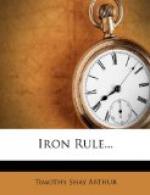“Ain’t I as good?”
Thus far Andrew gave utterance to what was in his thoughts, and then, seeing the tears of Emily, checked himself and became silent.
“You ain’t angry with me, are you?” asked the little girl, laying her hand upon his, and looking earnestly in his face.
“No; I’m not angry with you, Emily. I’m never angry with you. But it’s hard. I’d rather see you than anybody. I don’t care what becomes of me now! Let them send me to sea if they will!”
At the word “sea” Emily’s face grew pale, and she said in a choking voice,
“O! they won’t send you to sea, Andrew?”
“Father threatened to send me to sea if I didn’t attend school better.”
“But you will attend better, Andrew. I know you will. Oh, it would be dreadful to be sent to sea!”
“I don’t know. I’d as lief be there as anywhere else, if I can’t see you!”
“But you will see me sometimes. We can’t meet any more as we go to school; but we’ll see each other often, Andrew.”
These words lifted much of the heavy weight that pressed on the feelings of the boy.
“When will we see each other?” he asked.
“I don’t know,” replied Emily. “Father said we musn’t meet going to school; but there will be other chances. Good-by! I wouldn’t like father to see me here, for then he would think me a very disobedient girl.”
And saying this, Emily turned and ran fleetly away. Andrew’s feelings were relieved from the pressure that rested upon them. Still he felt angry and indignant at Mr. Winters, and this state increasing rather than subsiding, tended to encourage other states of mind that were not good. With a feeling of rebellion in his heart he returned home, where he found no difficulty in provoking some reaction, and in falling under the quickly excited displeasure of his father, who was ever more inclined to seek than overlook causes of reproof. The consequence was, that when he left home for school in the afternoon he felt little inclination to attend, and, after a slight debate, yielded to this inclination. A little forbearance and kindness would have softened the child’s feelings, and prompted him to enter the right way. But the iron hand was never relaxed, and there was no room beneath it for the crushed heart of the boy to swell with better impulses.
At supper time, on that evening, the boy was absent. He should have been at home nearly two hours before.
“Where is Andrew?” asked Mr. Howland, as they gathered at the table.
“I’m sure I don’t know,” replied Mrs. Howland, in a voice touched with a deeper concern than usual.
“Has he been home since school was dismissed?”
“No.”
“Was there ever such a boy!” exclaimed Mr. Howland.
“Most probably he has been kept in,” suggested the mother.
“Edward, go round to the house of his teacher and ask if he was dismissed at five o’clock,” said Mr. Howland.




